Who has not found themselves faced with fiscal impediments, treacherous associates, and disappointing rulers? Ordinary methods for evading such complications are often time-consuming, expensive, or unpleasant. Over the millennia, discriminating consumers have turned to one method to fix such pesky problems: assassination1.
Assassination and assassins have always been plot catnip for SFF authors. Herewith five works that examine the topic.
Polar City Blues by Katharine Kerr (1991)

The Republic’s independence depends on avoiding conquest by either of the Republic’s more powerful neighbors, the Alliance (dominated by the Master Race) and the Confederation (dominated by the carlis). The last thing Polar City Police Chief Bates needs is for someone to target consular personnel. What he gets is the cooling body of murdered Confederation protocol officer Imbeth ka Gren.
Working out who ordered the hit proves straightforward: the Master Race. Determining who the killer was may be more difficult, as the Master Race used a human cat’s-paw. Time is of the essence; job stress has left the Master Race’s chosen tool quite unhinged, and he is a danger to more than one consular staff member.
Polar City Blues is a demonstration of the old adage that sometimes it isn’t the crime that gets one in hot water so much as the attempt at a cover-up. The assassin is trying to eliminate every potential witness to the original murder; there may be witnesses to these new murders, witnesses who must also be killed. Result: the killer may have to murder the entire Polar City population one person at a time2.
Ward Against Death by Melanie Card (2011)
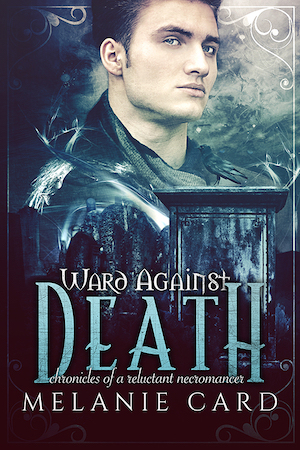
Disgraced necromancer Ward de’Ath is hired by murder victim Celia Carlyle’s grieving family to revive her just long enough for a final farewell. Once resurrected, Celia has other plans: she is determined to find her killer. Celia drafts Ward to keep Celia necromantically animated.
To his increasing alarm, Ward discovers Celia is not some innocent high-born victim. She comes from a family of assassins. Celia is an assassin herself. Her enemies are also experienced killers. Ward’s talents are sufficient to keep Celia alive(ish)… but who is going to keep Ward alive?
Just to clarify, Ward is not disgraced because he is a necromancer. Necromancy is a respected profession. Ward is disgraced because he dabbled in the forbidden art of mundane surgery…
The Story of Hong Gildong translated by Minsoo Kang (2016)
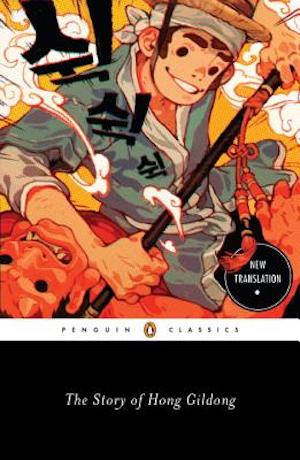
This Joseon Era Korean historical adventure recounts the doings of protagonist Gildong.
If Gildong’s mother had been Minister Hong’s legal wife, Gildong would be ensured a prosperous life as a senior functionary. But he is just the illegitimate son of a maid, and his state-mandated future will be quite humble.
Minster Hong’s wife Chorang fears that Gildong will rebel against his fate. She employs master assassin Teukjae to kill the youngster. Gildong would be doomed—were he not a boy of sterling character, keen insight, scholastic talent, and sorcerous skills.
As you might expect, Gildong is not in fact doomed. If I were to compare him to Western mythical figures, he would be a combination of Robin Hood and Merlin. Those who oppose him end badly.
Forest of Souls by Lori M. Lee (2020)
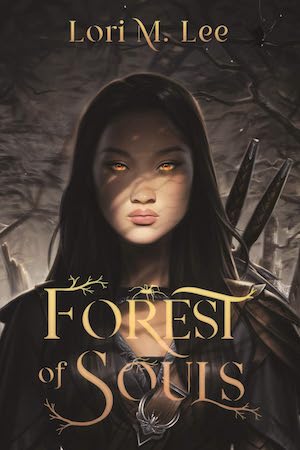
Foundling Sirscha Ashwyn escaped from a humble life of servitude by apprenticing to Kendara the Shadow, master spy/assassin for the kingdom of Evewyn. In return for being taught skills of combat and stealth, Sirscha carries out Kandara’s orders without question.
What should have been a straightforward career arc of murdering people until she encounters someone even more skilled is complicated when Sirscha’s slain companion Saengo very unexpectedly comes back to life. Sirscha discovers that she is a shaman and Saengo is now her familiar.
This unexpected revelation has many consequences, not least of which is that powerful people now need Sirscha dead.
While Sirscha is a perfectly sensible person who pursues entirely logical courses of action, this cannot be said for those she encounters. There are a surprising number of opponents who, when confronted with Sirscha, think fighting her is a good idea.
It is not a good idea.
An additional complication: Saengo is surprisingly ungrateful for resurrection, given that his only other option is being a corpse.
A Thousand Recipes for Revenge by Beth Cato (2023)
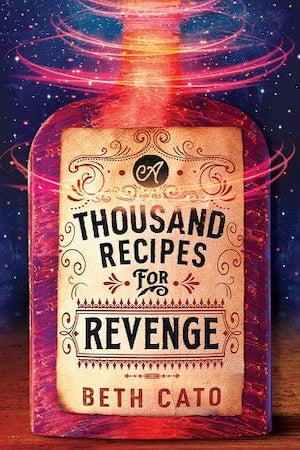
Princess Solenn is slated to marry Verdanian Prince Rupert; the alliance may save her nigh-defenseless kingdom of Braiz. But Rupert is being targeted by an assassin (something that Solenn knows but dares not explain).
How does she know? Solenn is a Chef, born with enhanced taste and smell. She can tell when food and drink has been poisoned. This talent could be useful to powerful people, who would be happy to put Solenn on their staff—by any means necessary. She cannot reveal her talents without inviting danger.
Solenn tries to protect Rupert without revealing that she is a Chef. Solenn fails to protect the Prince. Her attempts to protect him inadvertently give the impression that Solenn herself was the assassin. An unpleasant death seems certain.
The discovery that an angry god plans an apocalypse is almost a welcome distraction.
Recipes is yet another fantasy set in a secondary-universe monarchy. It does not make a good case for monarchy as an effective system of government. If anything, it argues the opposite. Braiz’s monarchs treat Solenn as the national designated Redshirt, while Rupert’s father, King Caristo, confuses vindictiveness with prudence. At least the people have the gods to turn to…except in this case, the gods seem even less reliable than the monarchs.
Professional assassins being as useful as they are—not least to authors—they appear in many SFF novels. The five works I’ve discussed are only a tiny sample of assassin-focused literature. Feel free to mention the more obvious omissions—yes, yes, even that Pratchett book—in comments below.
- I’m limiting myself to professional assassins here. Amateur assassinations are a subject for another day.
- Once the Polar City population was down to Bates and the killer, it would be pretty easy for Bates to work out who the killer might be.










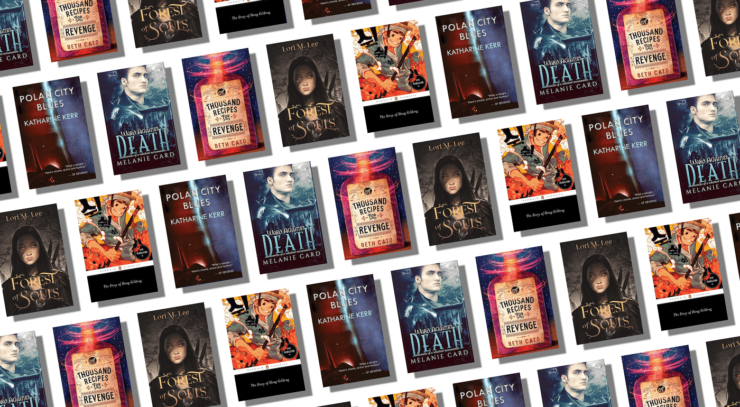
The only professional assassins I recall in books I’ve read were a guild of them in ADF’s Humanx Commonwealth books, and they seemed to be rather incompetent, maybe because their targets had high grade plot armor. I don’t even recall any in the Thieves World books I read.
The Bonney Brothers in “Lone Star Planet” were hired killers, but hardly professional.
The Last Enemy, one of H. Beam Piper’s Paratime stories, has an alternate Earth with a Society of Assassins.
Pratchett famously had an assassins’ school next to a jesters’ school. There was very little laughter from the jesters; humour is a serious business. There was lots of laughter from the assassins but over time there were fewer and fewer voices…
The assassin’s school also had the unprecedented event of staring down down the newly professional Watch. Cue a bunch of elegant assassins realizing just how ineffective their rapiers and poisoned daggers would be against a troll welding a siege crossbow…
Somewhere in the Discworld books, we learn that the assassins’ guild school enrolls a lot of boys from upper-class families who don’t know what else to do with their younger sons. There is at least a strong implication that part of the appeal for their parents is the school’s high mortality rate.
That’s from Pyramids, I think.
Rick Deckard from Dick’s Do Androids Dream of Electronic Sheep qualifies, even though he’s killing replicants, not humans. While the book doesn’t make it clear how human the replicants are, the film version has them human enough that even they can’t tell the difference.
Does Deadpool (Marvel) count? There’s a 4-part Marvel series in which Deadpool kills everyone in the Marvel universe then goes after the editors, writers and artists of his comics, and eventually the readers…
While the book doesn’t make it clear how human the replicants are
Are you kidding? The book makes it totally clear that the replicants are NOT human — the scene where Rachael tears the legs off a spider in particular. One of the many reasons why Philip K. Dick was a great writer is that the movie completely reverses the point of the book, but it still works.
I don’t agree that that is a thing that a human wouldn’t do. We tear the legs off chickens, don’t we. In the book, there aren’t many real animals alive anyway. The replicants are artificial workers, but they are people – arguably alien people rather than regular human. But it’s suggested that non neurotypical humans may test as android. Spoiler: many of Dick’s stories have characters who are some kind of android, whether they know it or not, and I interpret his type of “android” as just a different human race, and really deserving of human rights and not chattel slavery. We’ll just have to talk about the leg-pulling-off thing, See also Karel Capek’s famous “R.U.R.” where “robot” relations to humans are not well managed.
I’m not convinced that anyone in that book, including the author, is actually an honest observer, which is why I’m dubious about the humanity or lack of it of the replicants.
In Green, by Jay Lake, the eponymous character is trained as an assassin. But even though she is good at it, it wasn’t her choice. Readers expecting an ordinary assassin fantasy will be disappointed. But if you are looking for a complex fantasy about politics and religion and a character becoming her own person, read on.
Vlad.
‘Nuff said.
Shut up, Loiosh.
(Vlad Taltos from the Dragaera series by Steven Brust for the uninitiated. Pretty rare in fiction, in that his being an assassin isn’t always the main focus of the plot, it’s just his day job)
Well, and for a large chunk of the novels, he’s on the run, and not really working for hire.
Assassin of Gor.
Stephen King’s Billy Summers. Not much SFnal, but it is clear that the book is set in the same universe as The Shining.
No supernatural/SFF elements to it whatsoever, but Greg Rucka’s Atticus Kodiak (he’s a professional bodyguard) revolves heavily around a professional assassin, one of “The Ten.” Essentially an informal spook agency/security professional codename for the ten individuals most like Carlos the Jackal or Jason Bourne in the world. High literature it ain’t, but they’re entertaining and engrossing reads, and done right could be adapted into one hell of a streaming series.
David Weber’s Field of Dishonor* features an assassin whose mode is to trick the target into challenging him to a duel (on a world where (a) this is legal and (b) it involves “antique” pistols).
Gene Wolfe used a similar modus operandi in The Shadow of the Torturer, except that the duelist-for-profit is in it for himself (and his sister), not for hire.
JDN mentioned the Assassin’s Guild from Ankh-Moorpork; it is worth mentioning that the main character of one of his more standalonish Discworld novels, Pyramids, is a graduate of that Guild’s school.
In Brunner’s Stand on Zanzibar, one of the main characters, Donald Hogan, is “eptified” as an assassin by the military.
* This book appears to be rehashed in the recent Toll of Honor.
Duellist-assassins aren’t unheard-of historically IRL, although they’re more common in fiction. One is the target of death magic/the Bastard’s justice just before the beginning of The Curse of Chalion, the first of Bujold’s Five Gods stories, and IIRC Egil Skallagrimsson dispatches one in the eponymous Saga, appearing as champion for the target.
If I’m recalling correctly, the protagonist of N.K. Jemisin’s The Killing Moon is an assassin of sorts. The specifics escape me, but I believe his killing is generally accepted as a public service rather than simple murder-for-hire.
“I am too a Vorkosigan. The one who was trained as a deep-penetration mole and assassin. It really pisses me off when people underestimate me, y’know?”
Mark Vorkosigan, Mirror Dance
My first thought, natch, yet I’m not sure Mark qualifies as a professional.
Mick Farren’s novel Vickers.
Teppic in Pratchett’s Pyramids is a trained assassin, although just as he finished his training his father died and he was obliged to become the ruler of Djelibeybi.
His classmate Chidder appears to have made better use of his training, as an adjunct to his unofficial shipping and receiving business.
The Plotters (Un-Su Kim) follows a professional assassin who is waiting for his own name to appear on the kill list. It’s hard to identify speculative elements in the book, but it certainly feels like a sibling to Philip K. Dick’s A Scanner Darkly. Since I don’t have much knowledge about Korean society, I can’t say how realistic it is (versus fantastic).
One of the “most hated fantasy tropes” I have seen mentioned on Reddit is: the protagonist who is a famous assassin (like, wouldn’t being famous get in the way of your job?), who also does not actually assassinate anyone in the course of the story (slow month?), who is also a princess or other royal (so, the assassination business is just moonlighting, or maybe a hobby?). One is led to the painful conclusion that someone, maybe multiple someones, have written novels with this particular trope prominently deployed.
On one point, TV SF show “Andromeda” made an interesting creative choice, in 2002, to title an episode “The Leper’s Kiss”, involving a notorious assassin known as “The Leper” but whose actual identity is not known. As far as I remember, the name or the disease is not discussed in the story. A “Motto of the Assassin’s Guild” is displayed as the episode’s motto as well. As usual, you can find all this online,
IIRC, eptification makes Hogan an all-around survivor; death can happen if necessary, but isn’t his purpose and in one case is very much not the desired goal. OTOH, when he finally snaps he starts raving about how many ways he’s been shown to kill people (not unlike the opening scene of The Forever War?).
In Swordspoint, does Richard St. Vier count? He’s supposed to go through the formality of a duel rather than just killing someone as simply as possible, but ISTM that the intention and results are similar.
Wasn’t AngeIna, the Stainless Steel Rat’s wife, originally an assassin?
No, she was a serial killer, and general psychopath.
We all have flaws.
The Farseer trilogy: Assassin’s Apprentice, Royal Assassin, Assassin’s Quest, is by Robin Hobb a.k.a. Megan Lindholm. As one might think, by the titles, it is about an assassin. Who goes on to better things, so I guess I’m not doing so well at picking purely assassination oriented books. But it’s one of the greatest epic fantasies of all time. Highly imaginative and diverse world-building. Plot twists worthy of Shakespeare. Unforgettable characters. Continued in the Tawny Man trilogy and the Fitz and the Fool trilogy, it somehow gets even better.
Tbh I found the world building on that one deeply underwhelming, the monarchy the protagonist works for/supports deeply incompetent and the government implausibly small for a state as significant as that one was supposed to be.
Oh, come on. You don’t have to appreciate the books. But if you didn’t get anything out of them, that doesn’t mean there is nothing there.
You gave your review and I gave mine, and I stand by it. I was curious what all the business with the Forging was in aid of, but the King’s response was so utterly inept that I couldn’t bear to keep reading, and my main question was why an enemy would bother with magical terrorism instead of sending thirty soldiers and five competent administrators to overthrow and replace what passed for a government there.
I quite liked Brenner, the assassin in the Clocktaur Wars Duology by T Kingfisher. Well, not actually liked, as he’s got the winning personality of someone who tends to view people as targets, but he was fun to read about.
In Zero World by Jason M. Hough an assassin/spy is sent to a parallel world in search of a rogue agent, and uncovers a whole lot more than he anticipated—including what he’s been up to, since his memories are wiped as soon as he finishes a job.
Mike Resnick’s Walpurgis III features an assassin protagonist named Jericho who’s hired to go to the Satanist-filled planet of Walpurgis III and kill its leader, who might actually be Satan.
CJ Cherryh’s Foreigner series has its Assassins’ Guild, a combination of privatized security service, body guard agency, peaceful conflict mediation, and Murder, Inc. Late in the series they fissioned to add extortion and and political terrorism to their portfolio of services.
Huh. Despite James’ prompt, no-one mentioned the Pratchett book ( Hogfather ) with the other professional Assassin. The one who freaks out other Assassins…
“It’s pronounced Teh-ah-tim-eh”
It’s also the guild that the Patrician graduated from
Main protagonist Otto McGavin in All my Sins Remembered (1977) by Joe Haldeman, starts as an ethical intelligence officer, but needs to perform increasingly bad tasks, including murders.
Maas’ Throne of Glass series features a trained assassin as the main character.
Poison Study by Snyder—-the genesis of an assassin
“Polar City Blues is a demonstration of the old adage that sometimes it isn’t the crime that gets one in hot water so much as the attempt at a cover-up.”
I live inside the beltway and work for the federal government. It is ALWAYS the coverup. Evidence 1: Watergate. Evidence 2: A certain trial currently occurring in NYC.
How about the Night Angel books by Brent Weeks? Famous assassin with a twist.
Jennifer Estep’s Gin Blanco/Spider of the Elemental Assassin series has always been a favorite of mine. I didn’t want to like her – after all, she kills people for a living! – but I couldn’t help it. Because, who doesn’t love a good barbecue restaurant?